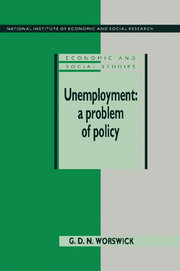Book contents
- Frontmatter
- Contents
- List of tables
- List of charts
- Preface
- 1 INTRODUCTION
- 2 CONCEPTS AND MEASUREMENTS
- PART 1 STRUCTURAL CHANGE
- 3 TECHNOLOGY AND EMPLOYMENT
- 4 THE IMPACT OF INFORMATION TECHNOLOGY
- 5 STRUCTURAL UNEMPLOYMENT
- 6 THE REGIONAL PROBLEM
- 7 WHO WILL PROVIDE THE JOBS?
- PART 2 THE WAGE QUESTION
- PART 3 MACROECONOMIC POLICY
- PART 4 INTERNATIONAL DIMENSION
- Appendix to Chapter 8: The puzzle of the apparent fall in United States real wages
- Notes
- List of works cited
- Index
- THE NATIONAL INSTITUTE OF ECONOMIC AND SOCIAL RESEARCH PUBLICATIONS IN PRINT
3 - TECHNOLOGY AND EMPLOYMENT
from PART 1 - STRUCTURAL CHANGE
Published online by Cambridge University Press: 06 July 2010
- Frontmatter
- Contents
- List of tables
- List of charts
- Preface
- 1 INTRODUCTION
- 2 CONCEPTS AND MEASUREMENTS
- PART 1 STRUCTURAL CHANGE
- 3 TECHNOLOGY AND EMPLOYMENT
- 4 THE IMPACT OF INFORMATION TECHNOLOGY
- 5 STRUCTURAL UNEMPLOYMENT
- 6 THE REGIONAL PROBLEM
- 7 WHO WILL PROVIDE THE JOBS?
- PART 2 THE WAGE QUESTION
- PART 3 MACROECONOMIC POLICY
- PART 4 INTERNATIONAL DIMENSION
- Appendix to Chapter 8: The puzzle of the apparent fall in United States real wages
- Notes
- List of works cited
- Index
- THE NATIONAL INSTITUTE OF ECONOMIC AND SOCIAL RESEARCH PUBLICATIONS IN PRINT
Summary
INTRODUCTION
Many people believe that unemployment has risen to such high levels because technology, especially the revolution in information technology (IT), has destroyed jobs. It is recognised that there is a growing demand for highly trained men and women to construct and to operate computers, microprocessors and manufacturing processes based upon them. But the rising demand for electronic engineers, programmers and the like is far outweighed by the fall in demand for men and women – less skilled workers – whose tasks can now be performed by computer-controlled machinery. In the manufacture of cars, there may still be an assembly line, but there are few men and women adding and fixing component parts: the bulk of the tasks are performed by robots.
Confronted with such fears, we might first refer to history, and observe that technical change which ‘saves labour’ is neither new nor harmful. Without going as far back as the discovery of fire and the invention of the wheel, we might restrict ourselves to the changes of the past two hundred years since the industrial revolution began in Britain. In this short span of time, succeeding generations have seen remarkable changes in agriculture, in industry and in services, which have brought to the majority of people in the developed world standards of life which, before the eighteenth century, were the lot of only a small minority.
- Type
- Chapter
- Information
- Unemployment: A Problem of PolicyAnalysis of British Experience and Prospects, pp. 23 - 32Publisher: Cambridge University PressPrint publication year: 1991

